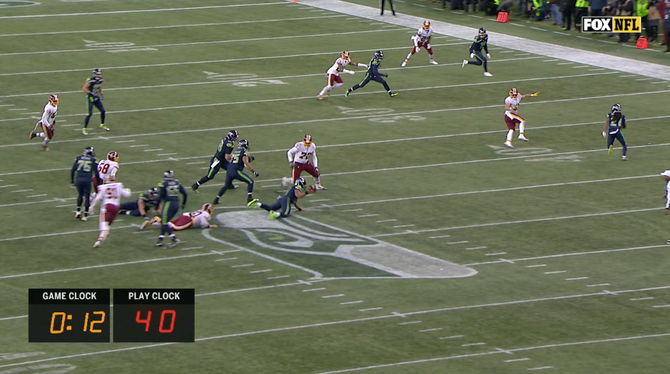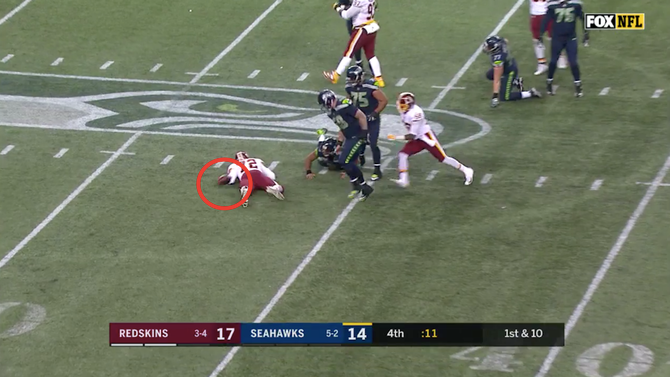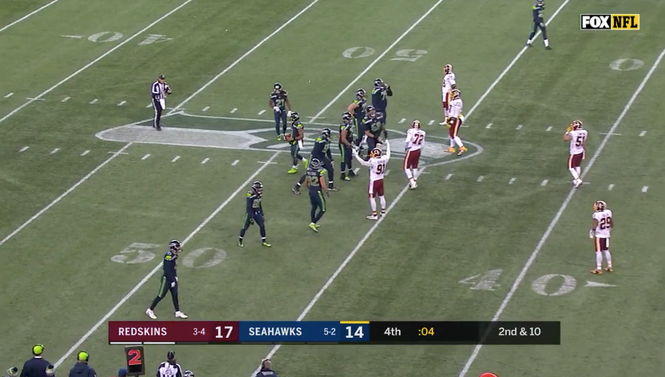What is an NFL week of action without some kind of officiating screwup? It's not a normal one, that's what, and this week featured a number of questionable moves by the officials when it came to handling players who are fighting, but it also featured a potential clock mishap at the end of the Redskins-Seahawks game.
In that particular contest, there is a very good rationale for why the Seahawks never should have had a Hail Mary at the end of the game. Fortunately for the NFL, Russell Wilson didn't complete the pass and the Redskins won the game.
In fact, as former NFL vice president of officiating Mike Pereira -- now with Fox Sports -- pointed out, "the NFL is pretty damn lucky that pass was incomplete." It was a close call too -- if DeAngelo Hall doesn't knock down the pass, the Seahawks win on another controversial late-game situation in Seattle.
HE'S BACK ❗️
— VT Football (@VT_Football) November 6, 2017
Not only did @DeAngeloHall23 return to the field, he knocked down the Hail Mary to seal the WIN! #LPD 💼 via @Redskins pic.twitter.com/RayfCpNHk5
So what was the error here? According to Pereira, the clock operator stopping the clock even though the officials correctly ruled Wilson down before he could throw the ball away essentially handed the Seahawks a free play.
"Really, should Seattle have had a chance to throw the Hail Mary and win the game? I don't think so. Because you've got a clock error. You've got an error on the clock," Pereira said. "You had 12 seconds when Russell Wilson went down on a knee, a whistle was blown, ending the play. The clock operator stopped the clock. So he stopped the clock with essentially 11 seconds to go. 17 seconds later, on a clock that was not supposed to stop, they're up at the line of scrimmage on a clock that was not supposed to stop, they're up to the line of scrimmage and spike the ball and the buzz came from replay right as the ball was snapped.
"So they're going to review it, that's another story. My issue with this is that the clock should not have stopped. I think it's reasonable to say Seattle may not have gotten off another play without this clock erroneously stopping."
Let's go to the tape.
Here's the next-to-last play, in which Wilson attempted to throw the ball away but was ruled down by the officials on the field. There were 12 seconds on the clock when Wilson was down.

At this point, the clock was almost stopped. If you watch the replay on NFL GamePass, what you see and hear is the clock operator freezing the clock at 11 seconds before the whistle is blown. It's close, but it's also clear there's an itchy trigger finger after seeing the ball leave Wilson's hand.
Presumably the clock operator froze the clock in a tight spot after seeing what he/she felt was an incompletion. But it was a quick pull, given that the referees had not whistled the play dead yet when the clock froze. Additionally, the referees ruled that Wilson was down before the throw. The clock should have never stopped.
And good luck to the Seahawks in getting a play off -- with 11 seconds left, the clock should have been moving, Wilson was on the ground after being ruled down and the ball was bouncing away from the line of scrimmage after inadvertently hitting the leg of an offensive lineman.

They are not getting everyone lined up, getting the ball back to the line of scrimmage and running a play in that time. The Seahawks were able to get lined up because they used somewhere in the range of 20 seconds to get lined up. Most of that was with the clock not running -- when Wilson walked away from the line of scrimmage after the referees whistled to review the play, there were four seconds left on the clock.

Making matters more confusing was the explanation of Pereira's partner on "Last Call," another former NFL VP of officiating, Dean Blandino, who said during the game that the officials were handling things correctly.
"So the key is that the ruling on the field is that Wilson was down by contact before he released the pass," Blandino explained during the Fox broadcast. "So on the field that keeps the clock running. They're looking at it -- they're going to confirm the ruling on the field and then basically when we come back they're going to wind the clock on the ready. There's no 10-second runoff here.
"No, basically, the ruling on the field was correct. They had him down. When they come down, they're just going to wind the clock on the referee's ready for play. There's no runoff here."
This is insane: the refs ruled that Wilson was down but the clock stopped inadvertently and then the officials sort of didn't realize it. That probably should be a 10-second runoff situation.
At the very least, Blandino later admitted that it was "really an unnecessary stop" of the clock and called it a "weird, funky ending to the game."
It seems to happen a lot in Seattle, and it almost happened again in Week 9. The NFL dodged a major officiating bullet here.

















